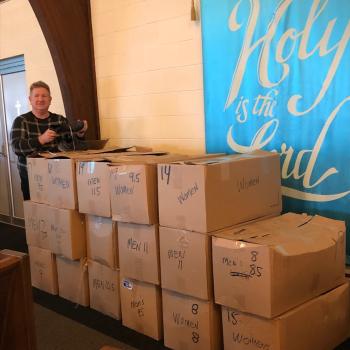That changed when I learned we were having a girl. Perhaps there is something especially sweet in the father-daughter relationship, or perhaps it was just that the image of my child became concrete. Whatever the reason, I spent the remainder of the day staring at the ultrasound photo and downloading father-daughter songs in a joyous tearful mess.
Blessedly wounded, I never recovered. Lifelong singles can, of course, lead joyful and fulfilling lives and there are other ways in which they are shaped. In retrospect, however, my life prior to parenthood was like a symphony constrained to a single note. In the year that followed my daughter's birth, I felt—really felt—the whole spectrum of human emotions, the depth and richness of human experience. Through my daughter's eyes, I remembered wonder. Her laughter and unbridled joy reminded me why the world is good. She was a vessel of grace, a sacrament, and she returned me to life.
She made me human. We make children who make us.
Finally, we have children because children teach us to love. Marriage tests and reforms us, and begins to teach us to give for the other's own sake, and not in the hope of reward or return; yet marriage promises that the spouse will do the same. Marital love cannot approach the self-sacrificial love of the parent, in which we pour ourselves out for the joy of seeing our children grow and flourish. In loving our children, many of us learn to love truly for the first time.
My daughter wrapped her hand around my finger mere moments after entering the world. She was comforted. I was captured. Although I was finishing my dissertation, I spent the nights in her room, helping her sleep through the pain of a milk allergy, then of colic, and then of reflux. I never asked for a break—not because of any virtue in me, but because I knew I could help her, and because it is sweet to give yourself when your beloved needs you.
My daughter survived that terrible night. As we neared the hospital, her jaw began to twitch, and just when I thought she was choking she was actually regaining control of her body. Her eyes focused on me, and she drew breaths swift and deep, confused and disoriented. Then finally she began to cry—long, deep sobs that were the sweetest music her father had ever heard.
The frigid night air had helped to cool her. Her brain was undamaged, and she has never since suffered another febrile seizure. And I have still never wondered whether I might have been happier without her. I certainly might have indulged myself more. But I would never have known this overflowing, self-giving love that has changed me forever.
We have no choice but to give ourselves for our children, but we learn that in giving ourselves we receive our selves. In the frailty of this little form that called such an immense love out of me, this bundle of winsome life and running legs and embracing arms, I share in the quintessentially human condition of loving recklessly what is fragile, fleeting, and at risk. There is nothing for it; I cannot help myself. Even at thirteen months, my daughter was sweet and vulnerable and of immeasurable sacred worth. She was not perfect, but she was everything that was good in me, and yet so much better, the highest art I had created, my only true thing in a counterfeit world. She was my little girl. She still is, and always will be. And the joy of loving and being loved by her—well, it was worth any sacrifice and any risk.




